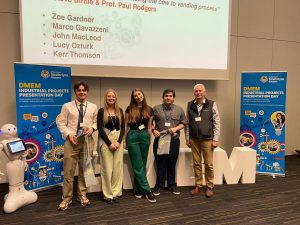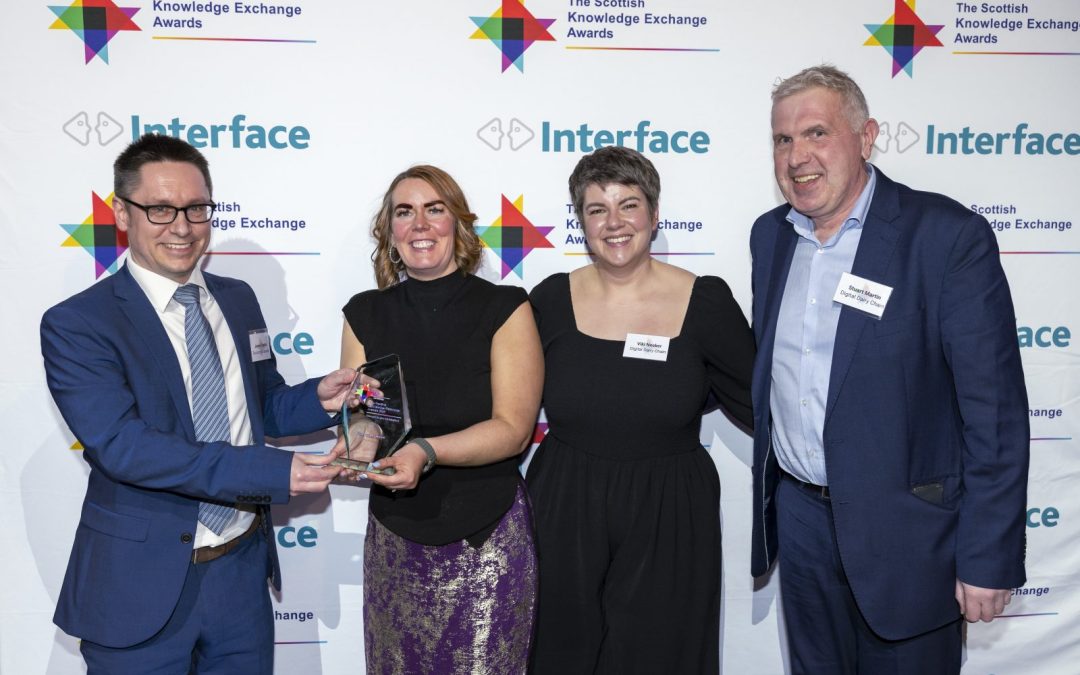Introduction

Innovation Broker, Mike, with our winning team
Each year the University of Strathclyde’s Design Manufacture and Engineering Management (DMEM) department students are involved in the Industrial Group Projects (IGP) module. The module involves several groups of final year Masters students taking on a consultancy role to work with an industry client. Throughout the year the groups work to design and develop a product or service which meets the brief set by the client.
In the 2023-2024 academic year, five teams of four students from the DMEM department took on the challenge put forward by the Digital Dairy Chain. For this project, they worked with Innovation Broker, Michael Christian from Digital Dairy Chain as their ‘client’. The aim was to demonstrate to Strathclyde Engineering students the opportunities in dairy agritech.
The project
The brief we set out was to develop and improve the systems currently used by dairy farmers in the UK to process milk onsite and sell directly to customers at farmgate and local delicatessens through vending machines which have become an increasingly popular way for dairy farmers to diversify their offerings and selling directly to customers allows them to make around 3.5 times more per litre of milk than selling in bulk to supermarkets.
The challenge
Each team visited several farms to witness first-hand the challenges that arose from the process of processing the milk and transporting it to a vending machine. For most of these students it was their first time on a dairy farm.
The challenges circled below were some of the issues that were witnessed by the team. Some of these were:
- Difficult to get trolleys over steps
- Wheels are too small and hard
- Heavy lid on current transporter
- New trailers have had to be built to support the process

Across the visits the teams identified common challenges. The farmers who were interviewed identified the trolley as causing the most challenges and teams were encouraged by the Digital Dairy Chain to look at this but also develop their ideas wider to ensure that all bases were covered throughout the whole process all the way to the end customers.
The outcome
All teams took the learnings from the farms to develop their solution, all coming up with different concepts. All concepts were then presented to a panel of industry experts and farmers to start to shape what features would be the most efficient to consider in a final product concept.
The points raised in the feedback session largely aligned with the strengths and weaknesses and this provided validation for which features to include and disregard.
The final product concept had the following key features based on feedback:

A single tank for both storing milk in a vending machine as well as pasteurising the milk with use of a “sleeve” linking to on farm heating and cooling systems
- Use of magnetic agitation
- Implementation of an automated cleaning lid
- A modular system for scalability
- Data collection with the inclusion of an app for data monitoring
- Greater customer inclusion for added user experience
The team then focused on improving the concept, covering the feedback on the form, movement and handling, processing of the milk, agitation of the milk, automated cleaning and data monitoring of time and temperature bringing together all the best features of each team’s submission.
Impact
- The impacts this new Moover and Pasteuriser could have been identified as:
- Reduction in time and manual labour
- Improved and automated cleaning
- Easier to handle and manoeuvre
- Improved performance through data collection and easy monitoring through an accompanying app
- Ability to sell directly to the customer
Thanks to all the student teams who took part in the Industry Group Project last year and for their brilliant concept outcomes which we hope may change and improve the way milk is sold at farmgate.
You can learn more about the Industry Group Projects here.
Submissions are now open for the year ahead. If you are interested in commercialising any of these ideas please get in touch at: ddc-innovations@strath.ac.uk




